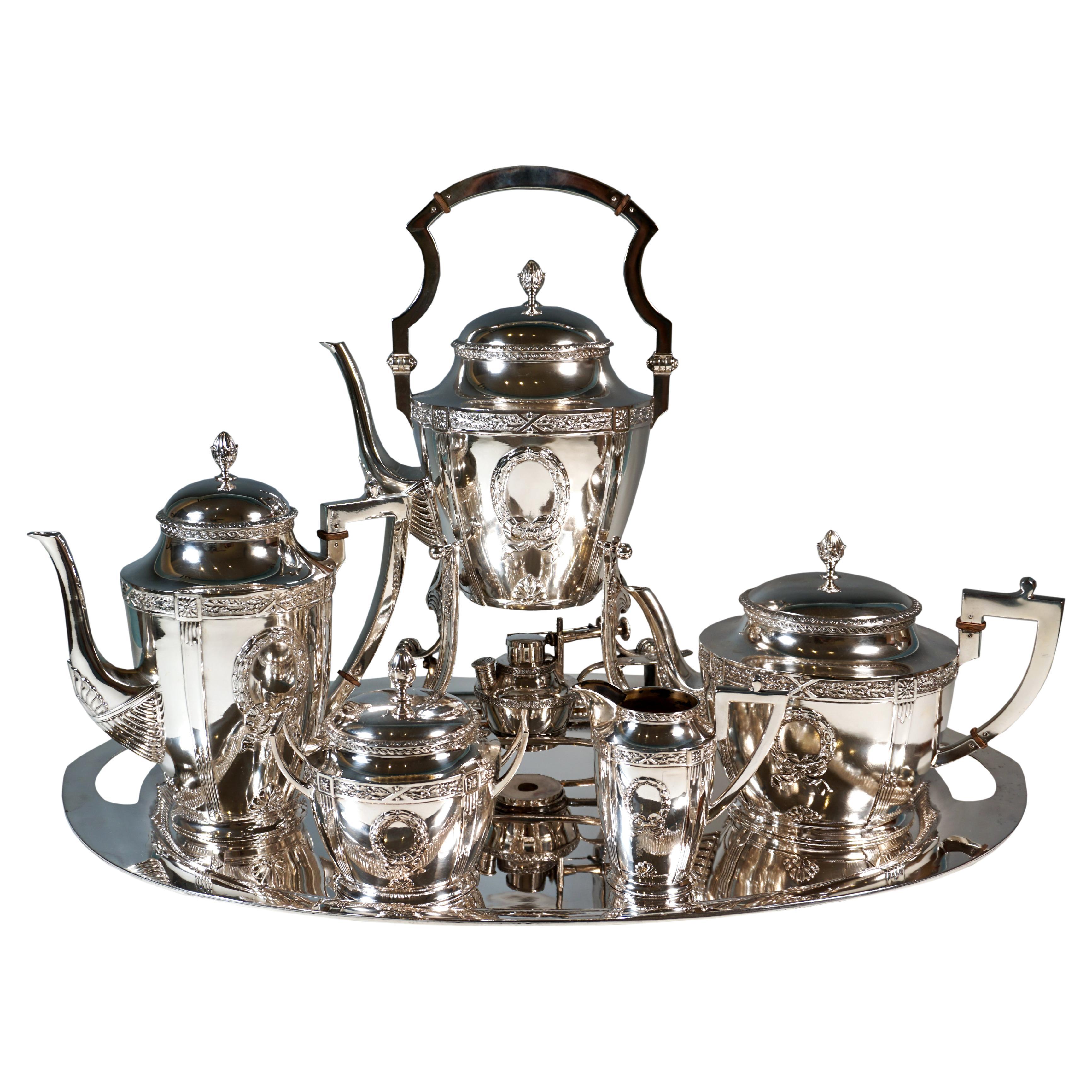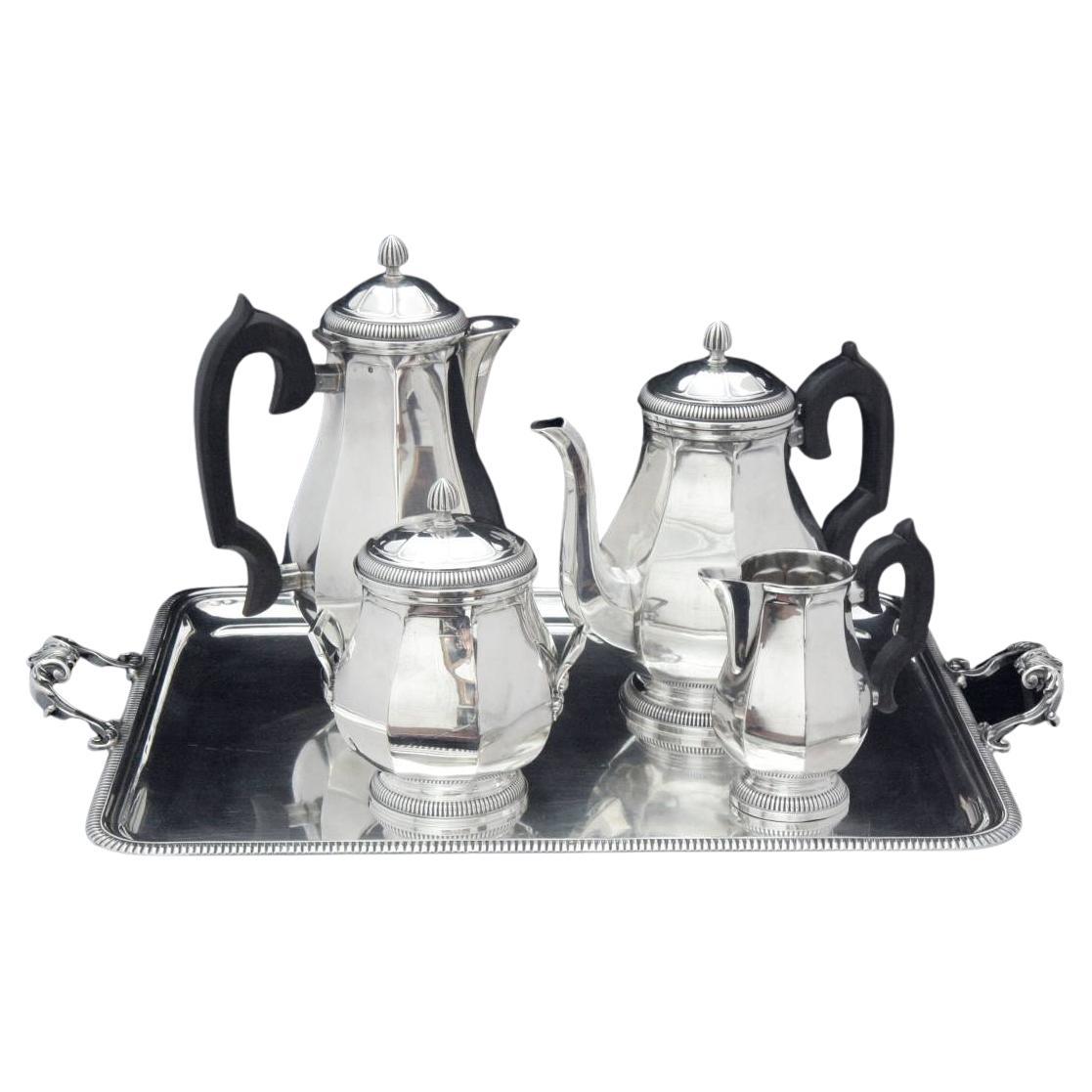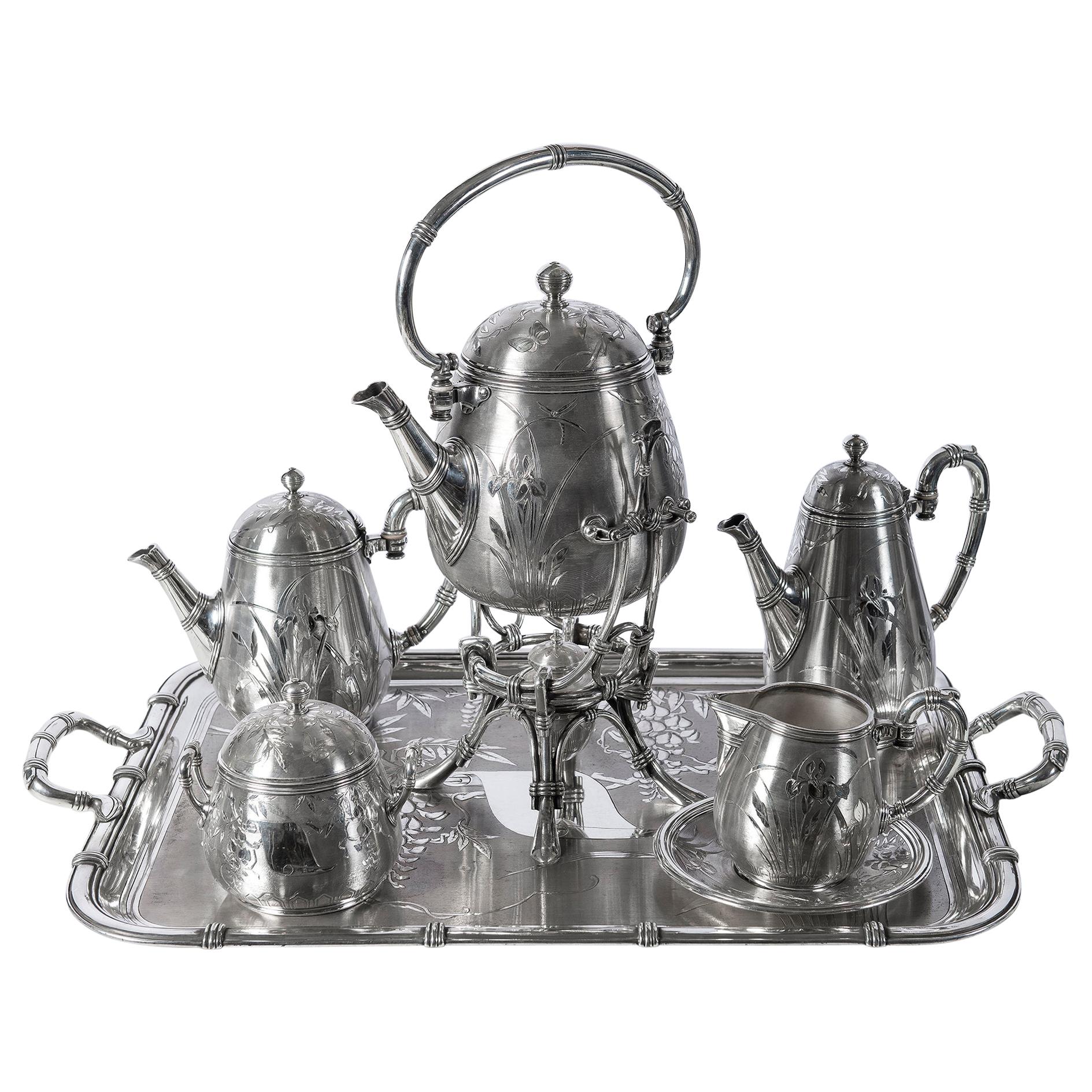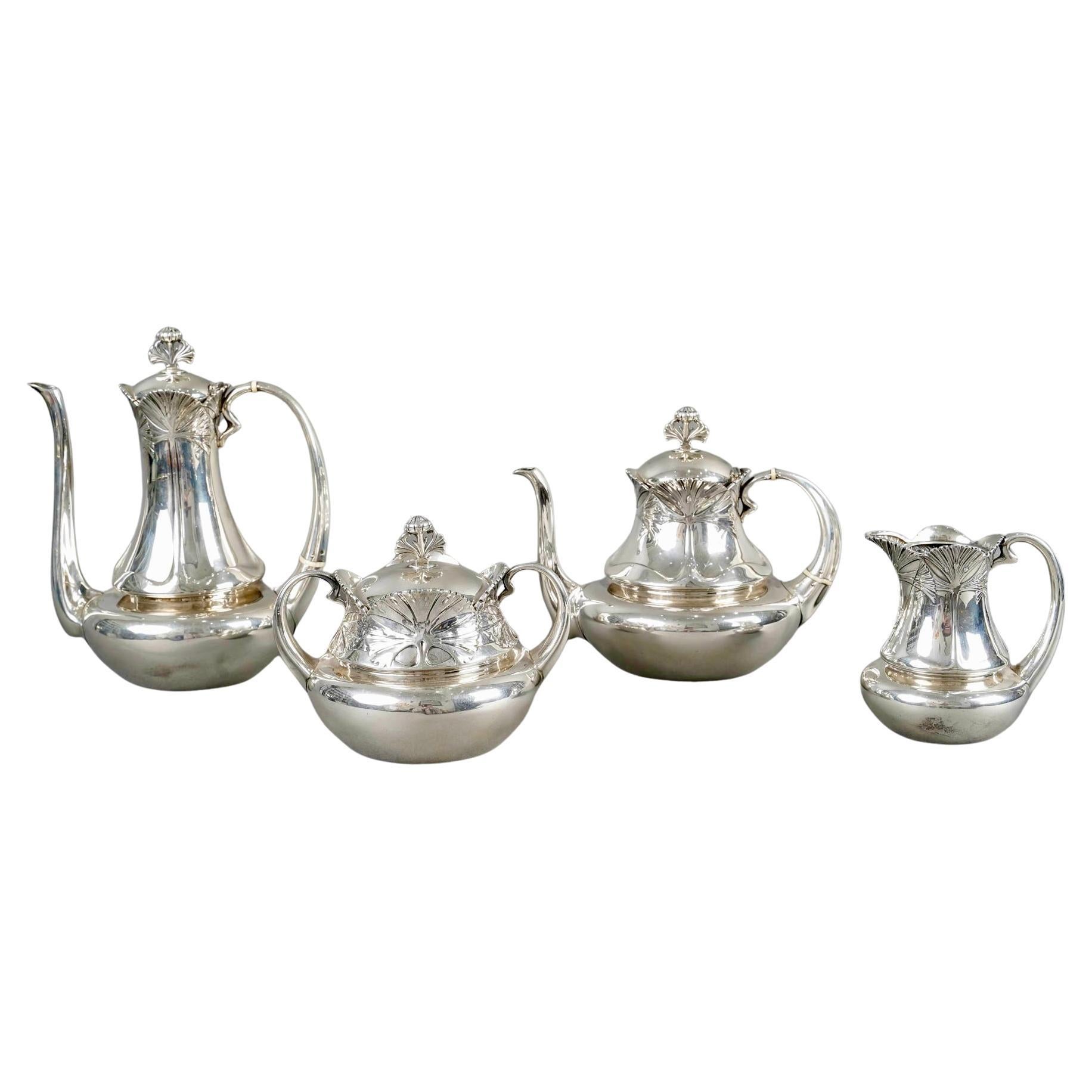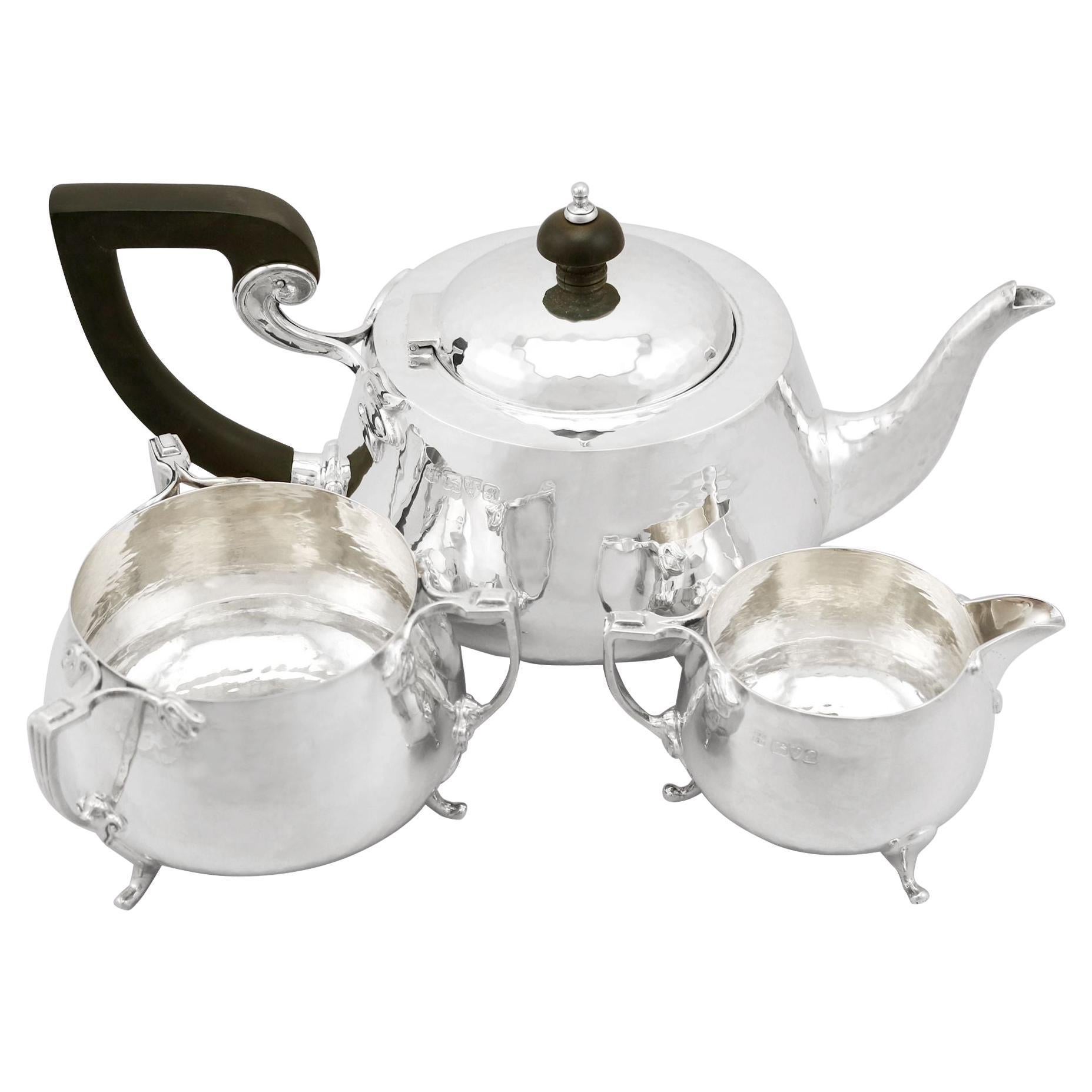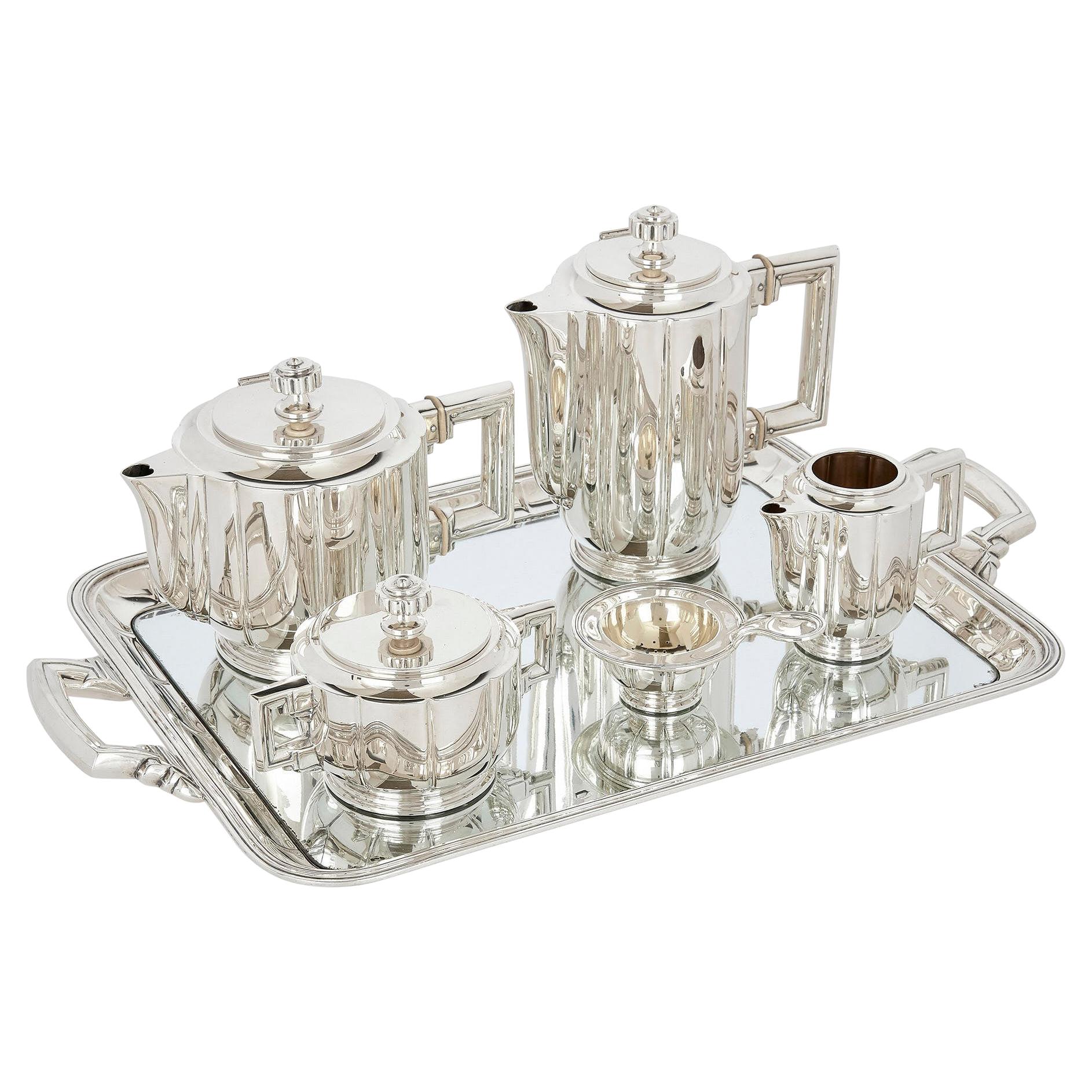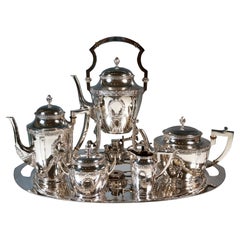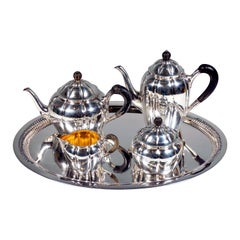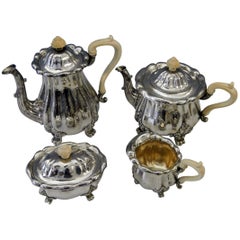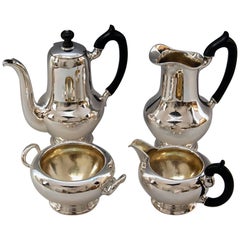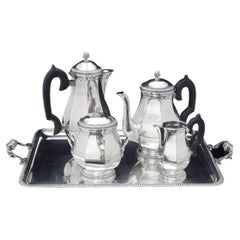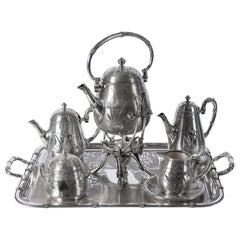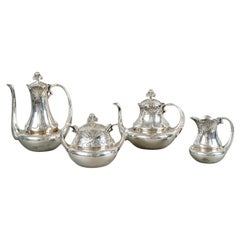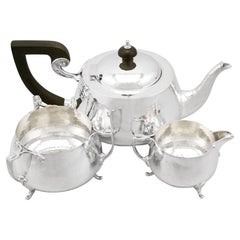Items Similar to Art Nouveau Viennese Silver 4-Piece Coffee Set, Vincenz Mayer's Sons, circa 1900
Want more images or videos?
Request additional images or videos from the seller
1 of 11
Art Nouveau Viennese Silver 4-Piece Coffee Set, Vincenz Mayer's Sons, circa 1900
$6,539.57per set
£4,870.47per set
€5,500per set
CA$9,172.08per set
A$10,059.34per set
CHF 5,188.02per set
MX$120,167.29per set
NOK 65,799.89per set
SEK 61,727.76per set
DKK 41,910.82per set
About the Item
Elegant, simple, 4-part silver core consisting of a coffee pot, milk jug, sugar bowl and tray. Vessels with an oval basic shape and smooth walls, narrowing slightly conically towards the top, with profiled ribbons on the lower edge and on top, here with crossed loops. Coffee pot with swan spout and hinged lid with a profiled silver button with bone ring as a handle, raised curved handles on all vessels, with bead rings made of bone at the coffee pot. Loose lid with a profiled silver button on the sugar bowl.
Rectangular, smooth tray with a circumferential, profiled band with crossed loops, on the short sides profiled handles with floral ends.
All parts monogrammed.
Branded by the Diana's head mark, the Viennese official hallmark 1872 - 1912 for 800 silver
Manufactory stamp: 'VMS' - Vincenz Mayer's Sons: Founded in 1810, was a jewelry company in Vienna, a former k.u.k. purveyor to the court and chamber jeweler of the emperor and empress, one of the most important order jewelers in Vienna in the 19th and 20th centuries. The company also supplied among others the courts of Serbia, Montenegro, Bulgaria, Greece, the Vatican, Persia, the Ottoman Empire, and much more. In 1922 the company had to close for economic reasons.
Dimensions:
Coffee pot H = 20.5 cm / 8.07 in
Creamer H = 9.0 cm / 3.54 in
Sugar bowl H = 10.0 cm / 3.93 in
Tray L x W = 48.5 x 32.5 cm / 19.09 x 12.79 in
Silver weight: 2054 grams / 72.30 oz / 66.04 troy oz
Excellent condition, perfectly cleaned and polished.
- Creator:Vincenz Mayer's Sohne (Manufacturer)
- Dimensions:Height: 20.5 in (52.07 cm)Width: 19.09 in (48.49 cm)Depth: 12.79 in (32.49 cm)
- Sold As:Set of 4
- Style:Art Nouveau (Of the Period)
- Materials and Techniques:
- Place of Origin:
- Period:1900-1909
- Date of Manufacture:circa 1900
- Condition:All silver parts are cleaned and polished.
- Seller Location:Vienna, AT
- Reference Number:1stDibs: LU1014420926152
About the Seller
5.0
Platinum Seller
Premium sellers with a 4.7+ rating and 24-hour response times
Established in 1988
1stDibs seller since 2013
312 sales on 1stDibs
Typical response time: 5 hours
- ShippingRetrieving quote...Shipping from: Vienna, Austria
- Return Policy
Authenticity Guarantee
In the unlikely event there’s an issue with an item’s authenticity, contact us within 1 year for a full refund. DetailsMoney-Back Guarantee
If your item is not as described, is damaged in transit, or does not arrive, contact us within 7 days for a full refund. Details24-Hour Cancellation
You have a 24-hour grace period in which to reconsider your purchase, with no questions asked.Vetted Professional Sellers
Our world-class sellers must adhere to strict standards for service and quality, maintaining the integrity of our listings.Price-Match Guarantee
If you find that a seller listed the same item for a lower price elsewhere, we’ll match it.Trusted Global Delivery
Our best-in-class carrier network provides specialized shipping options worldwide, including custom delivery.More From This Seller
View AllArt Nouveau Silver Coffee & Tea Set, Bruckmann & Sons for Fritz Loch, Germany
By Bruckmann & Söhne
Located in Vienna, AT
Excellent Art Nouveau silver coffee and tea set consisting of 6 pieces: coffee pot, teapot, hot water kettle with rechaud and burner, sugar bowl, cream jug and tray.
Bulbous, raised ...
Category
Antique Early 1900s German Art Nouveau Sterling Silver
Materials
Silver
Art Déco Silver 5-Piece Coffee & Tea Set with Tray, Around 1920
Located in Vienna, AT
Elegant 5-piece silver centerpiece consisting of a coffee pot, teapot, milk jug, sugar bowl and a tray.
Bulbous, raised vessels, narrowing again towards the opening, with a vertical...
Category
Vintage 1920s Swiss Art Deco Sterling Silver
Materials
Silver
Silver Hanau Coffee Tea Set Baroque Style Made by Schleissner Germany Circa 1890
By J.D. Schleissner & Söhne 1
Located in Vienna, AT
Silver stunning coffee / tea set in Baroque Style, Germany.
Manufactured by J.D. Schleissner & Sons (Hanau), made circa 1890.
This set consists of various parts:
Coffee pot hei...
Category
Antique Late 19th Century German Baroque Sterling Silver
Materials
Silver
$4,518 Sale Price / set
22% Off
Silver Austria Vienna Coffee Pot Milk Pot Sugar Bowl Creamer Klinkosch 1922-1925
By Josef Carl Klinkosch
Located in Vienna, AT
Silver Austrian gorgeous set of most elegant appearance:
Coffee pot
Milk pot
Creamer
Sugar bowl
manufactured, circa 1922-1925
Items of this set are manufactured in elegant st...
Category
Vintage 1920s Austrian Art Deco Sterling Silver
Materials
Silver
Art Nouveau Silver Tea Pot With Burner & Tray, D. Vollgold & Son Berlin, Germany
By German Manufactory
Located in Vienna, AT
Elegant silver teapot with a hexagonal cross-section on a hexagonal offset stand, six-sided swan spout, round opening with pearl band decoration on the side, slightly domed press-in ...
Category
Antique Early 1900s German Art Nouveau Sterling Silver
Materials
Silver
Viennese Art Déco Silver Peche Style Coffee Pot by J.C. Klinkosch, Circa 1920
By Josef Carl Klinkosch
Located in Vienna, AT
Excellent, elegant silver coffee pot in the style of Dagobert Peche's designs:
Raised, widening vessel on a stepped, funnel-shaped base, connected by a beaded ring with hammered, spi...
Category
Vintage 1920s Austrian Art Nouveau Sterling Silver
Materials
Silver
You May Also Like
Ernst Prost & Caron - 5pc Original French Art Deco 950 Sterling Silver Tea Set !
By Olier & Caron 1, E. PROST, Paris
Located in Wilmington, DE
Direct from Paris, a magnificent 5pc., original French Art Deco 950 sterling silver tea set by French silversmiths “Ernst Prost” and “Olier & Caron” in superb condition and includes 5 anti-tarnish storage wraps for easy storage – circa early 1900s. The world of silversmithing has long been synonymous with elegance, craftsmanship, and luxury. Throughout history, certain artisans have stood out as true masters of their craft, combining artistic vision with technical expertise to create timeless works of art. Among these luminaries is Ernst Prost, a French silversmith whose legacy is defined by extraordinary craftsmanship, royal patronage, prestigious accolades, and a body of work that bridges tradition and modernity. His most celebrated creations, particularly his exquisite Art Deco 950 sterling silver tea sets, embody the refinement and innovation that made him one of the foremost silversmiths of his time.
Ernst Prost was born into a family of craftsmen in the late 19th century, at a time when French silversmithing was undergoing a period of great transformation. Prost's early exposure to the craft, combined with formal training under some of the leading silversmiths of the time, laid the foundation for his career. From a young age, Prost exhibited a natural talent for working with silver, and he quickly developed a reputation for his meticulous attention to detail and his innovative approach to design. After completing his apprenticeship, Prost established his own workshop in Paris, where he began producing silver objects that were marked by their precision and artistic flair. His early work adhered to the classical styles that had dominated French silversmithing for centuries, but Prost was also eager to experiment with new forms and techniques. As his career progressed, Prost increasingly embraced the modernist aesthetics of the Art Deco movement, which would come to define much of his later work.
Prost’s work is distinguished by a number of key characteristics that set it apart from that of his contemporaries. First and foremost, Prost was known for the exceptional quality of his craftsmanship. Every piece that came out of his workshop was a testament to his technical skill and his dedication to perfection. Prost was a master of traditional silversmithing techniques, including hand-hammering, engraving, and repoussé. He also pioneered new methods, experimenting with different finishes and textures to enhance the visual and tactile qualities of his work. Prost's attention to detail extended to every aspect of his creations, from the overall design to the smallest decorative elements. His pieces were meticulously planned and executed, often featuring intricate engravings, geometric patterns, and floral motifs. Prost had a particular talent for integrating form and function, ensuring that even his most elaborate pieces were practical and easy to use.
By the early 20th century, the Art Deco movement had begun to sweep across Europe, influencing everything from architecture to fashion to industrial design. Characterized by its emphasis on geometric shapes, clean lines, and bold decorative elements, Art Deco represented a departure from the ornate, flowing forms of the Art Nouveau movement that preceded it. Instead, Art Deco embraced modernity, celebrating technology and innovation while still retaining a sense of luxury and elegance. Ernst Prost was profoundly influenced by the Art Deco movement, and many of his most celebrated works reflect its aesthetic principles. Prost's Art Deco silver pieces are marked by their bold geometric forms, streamlined designs, and the use of strong, symmetrical patterns. His tea sets, in particular, embody the elegance and simplicity that are hallmarks of the Art Deco style. Prost’s Art Deco tea sets often featured angular, stepped designs, with handles and spouts that mirrored the sharp, geometric lines of the overall composition. The surfaces of these tea sets were typically polished to a high sheen, creating a striking contrast with the engraved or embossed decorative elements. Prost also made extensive use of natural motifs in his Art Deco designs, incorporating stylized representations of flowers, leaves, and animals into his silverwork. These decorative elements were often rendered in a highly stylized, almost abstract manner, in keeping with the Art Deco aesthetic.
One of the most notable features of Prost’s Art Deco tea sets is the way in which they balance form and function. While the designs are undeniably modern and avant-garde, they are also practical and user-friendly. Prost paid careful attention to the ergonomics of his tea sets, ensuring that the handles were comfortable to hold, the spouts poured smoothly, and the lids fit securely. This combination of beauty and functionality is one of the reasons why Prost’s tea sets remain so highly prized by collectors and connoisseurs. These tea sets are celebrated not only for their striking beauty but also for their durability and practicality. Crafted from the finest 950 sterling silver, Prost’s tea sets are known for their radiant finish and exceptional craftsmanship. Prost’s tea sets were also notable for their balanced proportions and ergonomic design. The handles of the teapots and cups were designed to be both aesthetically pleasing and comfortable to use, while the spouts were carefully engineered to ensure a smooth, drip-free pour. Even the smallest details, such as the finials on the lids and the hinges on the sugar bowls, were meticulously crafted to ensure both functionality and beauty.
Ernst Prost's exceptional craftsmanship and innovative designs did not go unnoticed by the elite of his time. His work soon attracted the attention of European royalty, who were always on the lookout for the finest artisans to create luxurious objects for their homes and palaces. Prost’s reputation as a master silversmith made him a natural choice for royal commissions, and he quickly established himself as a favorite among the nobility. Prost's relationship with royalty was one of mutual admiration. The French royal family, in particular, became frequent patrons of his work, commissioning everything from elaborate tableware sets to ceremonial objects. Prost’s ability to combine traditional silversmithing techniques with modern Art Deco design made him particularly well-suited to creating pieces that were both functional and symbolic of royal power and prestige. One of Prost’s most notable commissions came from King George V of England, who requested an Art Deco tea set for his private collection. This commission was a significant honor for Prost, as it demonstrated that his work had gained international recognition and was sought after by some of the most discerning clients in the world. The tea set Prost created for King George was a masterpiece of Art Deco design, featuring sleek geometric forms, elegant engravings, and the finest 950 sterling silver.
Ernst Prost’s career was marked by numerous awards and accolades, reflecting both the quality of his craftsmanship and the innovative nature of his designs. His participation in international exhibitions allowed him to showcase his work to a global audience, and his Art Deco tea sets, in particular, were frequently singled out for praise. One of the highlights of Prost’s career came in 1925, when he exhibited at the International Exhibition of Modern Decorative and Industrial Arts in Paris, the event that is widely credited with popularizing the Art Deco movement. Prost’s work was displayed alongside that of other leading silversmiths, but it was his tea sets that garnered the most attention. The judges were particularly impressed by the way Prost had managed to incorporate the bold, geometric forms of Art Deco into functional objects, and he was awarded a grand prize for his contributions to the exhibition. In addition to his royal patrons, Prost’s work was also sought after by wealthy collectors and connoisseurs around the world. His tea sets and other silver objects became status symbols for those who could afford them, and owning a piece by Prost was seen as a mark of refined taste and sophistication.
Ernst Prost’s impact on the world of silversmithing and decorative arts extends far beyond his own lifetime. His work set a new standard for quality and craftsmanship, and his innovative designs helped to define the aesthetic of the Art Deco movement. Prost’s ability to blend traditional silversmithing techniques with modern design principles ensured that his work remained relevant and influential even as tastes and trends changed. Prost’s legacy is also reflected in the many artisans he trained and mentored over the course of his career. His workshop in Paris became a center of excellence for silversmithing, attracting young craftsmen from across Europe who sought to learn from the master. Many of Prost’s apprentices went on to become successful silversmiths in their own right, carrying forward the techniques and principles that Prost had instilled in them.
Today, Ernst Prost is remembered as one of the greatest silversmiths of the Art Deco era, and his work continues to be admired by collectors, museums, and connoisseurs around the world. His Art Deco tea sets in particular, like this amazing 4 piece set, remain highly sought after for their beauty, craftsmanship, and historical significance. Prost’s creations can be found in some of the most prestigious collections, including the Louvre in Paris, the Victoria and Albert Museum in London, and the Metropolitan Museum of Art in New York.
This amazing 950 sterling silver art deco tea set...
Category
Early 20th Century French Art Deco Sterling Silver
Materials
Sterling Silver
$16,196 / set
Free Shipping
Silver Plate Tea and Coffee Set, Bamboo Model by Christofle, France, circa 1890
By Christofle
Located in Buenos Aires, Buenos Aires
Silver-plate tea and coffee set, bamboo model by Christofle, France, circa 1890.
1 tray, 1 samovar, 1 teapot, 1 coffeepot, 1 sugar bowl and 1 milk jug.
All pieces are signed.
Category
Antique 1890s French Art Nouveau Tea Sets
Materials
Silver Plate
1900 Alphonse Debain - Art Nouveau Papyrus Tea Coffee Set Sterling Silver
By Alphonse Debain
Located in Boulogne Billancourt, FR
Art Nouveau Tea Coffee Set "Papyrus" made in sterling silver created in 1900. Exhibited at the Universal Exhibition of 1900.
All pieces are stamped.
Service including:
- a 24 cm hig...
Category
Antique Early 1900s French Art Nouveau Sterling Silver
Materials
Sterling Silver
Antique Art Nouveau Style Sterling Silver Three-Piece Tea Service
By Herbert Edward Barker & Frank Ernest Barker 1
Located in Jesmond, Newcastle Upon Tyne
A fine and impressive antique George V English sterling silver three-piece tea service in the Art Nouveau style; an addition to our antique teaware collection.
This fine antique G...
Category
Vintage 1910s English Art Nouveau Sterling Silver
Materials
Sterling Silver
Art Deco Spanish Silver Coffee and Tea Set
Located in London, GB
Art Deco Spanish silver coffee and tea set
Spanish, c. 1930
Tray: height 3cm, width 56cm, depth 35cm
Milk jug: height 10cm, width 13cm, depth 8cm
...
Category
Early 20th Century Spanish Art Deco Tea Sets
Materials
Silver
$20,543 / set
Christofle Coffee Tea Set Bamboo Style Art Nouveaux ca' 1890
By Christofle
Located in St.Petersburg, FL
A stylish Art Nouveaux, bamboo coffee/tea set by Christofle, ca' late 1890's. Comprising of five pieces in total including the tray. Original condition with tarnishing, could be poli...
Category
Antique 1890s French Art Nouveau Sheffield and Silverplate
Materials
Silver Plate
More Ways To Browse
Coffee Spout
Swan Pots
German Sterling Coffee Set
Georg Jensen Pyramid Spoon
Antique Furniture Edinburgh
Antique Potato
Antique Sterling Wine Coaster
Colonial Silver Spanish
English Sterling Silver Salvers
Lily Of The Valley Sterling
Paul Revere
Sheffield England Silver Serving Spoon
18th Century Spoons
Antique 800 German Silver
Antique Pie Servers
Antique Russian Cloisonne Enamel
Arts Crafts Silver Enamel
Footed Sterling Silver Bowl
